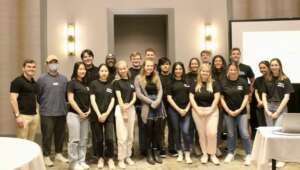
iTREDS Cohort I (2020-2022) Completes Capstone Presentations
With the end of the session upon us, we wanted to give everyone an update on our iTREDS Cohort I (2020-2022), who finished up their capstone work this spring. These exceptional students completed their experiential learning opportunities, comprised of a summer internship and capstone project, where they developed expertise in effectively engaging with stakeholders and incorporating the utility and value of data science for societal impact. They received a stipend of $5,000 for their capstone research, the goal of which is to embue scholars with an in-depth data science background as well as develop their communication, critical thinking, teamwork, and other skills necessary for effective, professional data science contributions.
So what’s involved? All iTREDS scholars are required to complete a capstone project in the second year of the program, or their Senior year. The capstone is typically a real-world, community problem in need of an actual solution, rather than a hypothetical problem. This encourages community collaboration, listening, and clear definitions, and requires these scholars to bring their accumulated data acumen to the table.
The scholars are organized into interdisciplinary teams of up to 4 members, and each team collaborates with a stakeholder partner on the creation of a capstone project. The University of Notre Dame’s Center for Civic Innovation and Center for Social Concerns help facilitate this through their existing community and regional partnerships.
The scholar teams give a final presentation on their capstone projects at the end of the Senior year Spring semester. The capstone process culminates with the required final written report on their capstone project, reflecting critical themes from the core courses of Design Thinking and Data Ethics.
The 2022 Cohort had a total of five teams. At the end of the Senior year Spring semester, iTREDS scholars give a TED-style talk to the audience, which consists of internal stakeholders as well as the broader data science community, members of other DSC-funded projects, and high school students and teachers from the region.
They all brought creativity and passion to their capstone projects, so let’s meet them now!
TEAM 1: Modeling A Pandemic: COVID-19

The purpose of this project was to use data analysis to understand how media dissemination and disinformation impacted public opinion and actions surrounding COVID-19 and vaccination, with the goal of better preparation and strategy for similar future events.
Members:
- Heather Farrell
- Yu Min Lee
- Gary Leng
- Alexia Velazquez
TEAM 2: Student Mental Health Impact of COVID-19

This project aimed to identify and explore the mental health impact the COVID-19 pandemic has had on college students, specifically in the tri-campus community, with a goal to help guide decision-making that emphasizes student mental health in the future.
Team:
- James Heneghan
- Jack Gordley
- Megan Geiler
- Caitlin O’Brien
- Juliana Ramos
TEAM 3: Developing an App for Facilitating Communication Between HIMFG and Cancer Outpatients

One of Hospital Infantil de México Federico Gómez’s (HIMFG) responsibilities is treating children with cancer, many of whom are sent home after treatment to recover. The goal of this project is to provide them with a mobile application that doctors and professionals at HIMFG can use to interact with outpatients and vice versa, and outpatients can use to access additional health resources when a doctor is not physically available. This project is an important step in helping smooth communication between the hospital and its outpatients, as well as providing outpatients with the knowledge, assistance, and guidance needed to monitor their health.
Team:
- William Gentry
- Elizabeth Medina
- Claudia Patterson
- Patrick Soga
- Komal Wani
TEAM 4: An Investigation of the Sustainability of the Gig Economy, Power in the New Tech Economy, and The Opportunity to Create a More Inclusive Digital Age

The gig economy is a quickly growing and expanding industry, with more and more people utilizing freelance and independent contractor services through companies like Uber, DoorDash, and Airbnb. As the number of gig consumers and laborers increases, so does the importance of analyzing and scrutinizing these companies’ business models, ethics policies, and employee relations. This project explores the current state of the gig economy with the end goal of proposing a solution to some of its major ethical and financial issues.
Team:
- Conor Holahan
- Ryan DeStefano
- Emma Dudrick
- Samantha Allison
- Brian Cariddi
TEAM 5: Building Literacy Around Police Recruitment in South Bend Through Data Visualization and Storytelling

The South Bend Data Portal has a lot of useful data but is very difficult for most people to navigate and access, rendering that data far less useful. A primary example is a dataset on South Bend Police Recruitment within the past four years. This data not only gives the ethnicity and background of the individuals who applied but also details about where in the application process those applicants were unsuccessful.
The purpose of this project is to create a data collection and visualization platform to be used by the South Bend Police Department and the greater South Bend Community to interpret and gain insights from the SBPD Recruitment Data. We hope to gain insights into improving South Bend Police Recruitment through a community-driven platform.
Team:
- Yize Qi
- Hongrui Zhang
- Tarik Brown
Congratulations to all the cohort teams for completing these extraordinary projects! For more information on iTREDS, you can access the iTREDS information page here. You can also reach out to Sugana Chawla, iTREDS Project Coordinator, at schawla@nd.edu.
